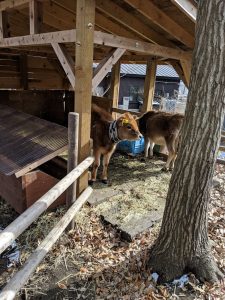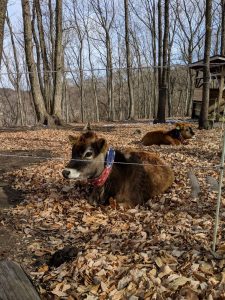Just a few days ago, we paid a delightful visit to a small dairy farm operation about an hour or so away from ARI by bus. We were treated to some beautiful weather (falling snow), and some very cute cows.

I mean, just look at them. This little dairy farm in the middle of the woods — which are actually important here — is raising around 20 head of jersey cows, from calves to full-grown. Despite what some people might call the rather unconventional environment for raising cows, from what we saw the cows were about as content as they are in Northfield (lacking the colleges, though).
Beyond the “unique” factor of raising cows in the middle of the woods, we were surprised to learn that there’s a rather ingenious method to keeping the cows there, rather than in a large grazing plain or other ranch that you might see in America. 70% of land in Japan is forested, which was news to me. Another surprise — 40% of that number is forests that were planted for the express purpose of cultivating trees and bamboo for commercial use. Incredibly, nearly half the forests in Japan are “artificial”, or manmade.
What’s baffling, though, is that we learned many of these forests have now fallen into disuse. Somehow, imported lumber is far cheaper than locally sourcing lumber from the vast number of forests around the country. Thus, these forests have fallen into disuse, victims of the unsustainable and non-local environmental thinking that we have investigated in our readings and other experiences.

However, we learned from the little farm’s proprietor that cows are uniquely capable of helping make use of formerly-managed forest land, preventing it from becoming overgrown and inaccessible. The jersey cows being raised on the farm are willing to eat a vast majority of the underbrush growing in ill-managed forests, meaning that they are capable of cleaning the land — for free, and with the added benefit of producing milk that can be sold!
Compared to the persistent blight of Ashio copper mine, the ongoing cleanup from Fukushima, and other bleak environmental messages that we’ve encountered during our trip, this little farm was a much-needed breath of fresh air. The enthusiasm of the proprietor was infectious, his energy and passion for a unique, sustainable dairy farm serving as a reminder that there are people out there who do care deeply about the environment and their impact on it.
It’s easy to forget that little bastions of environmental growth and sustainable practice exist, bombarded as we are with constant reminders that our planet is falling apart. But, they exist. And who knows, little farms like the one we visited could appear all over the place with a little effort. The world needs more cows in forests.
Recent Comments